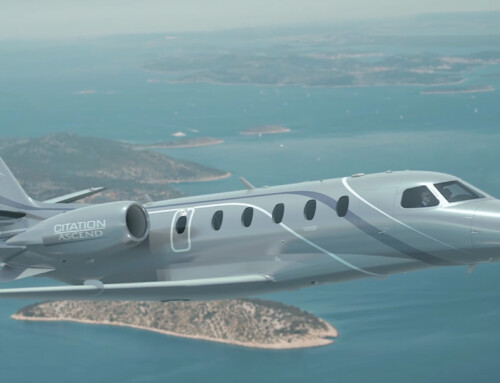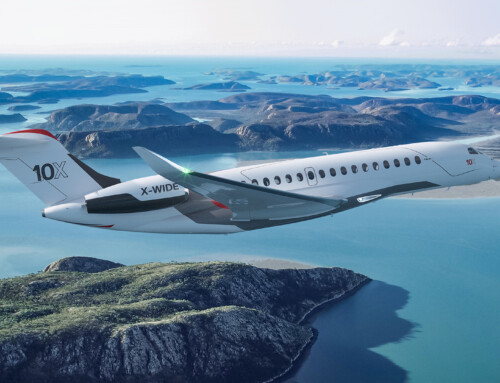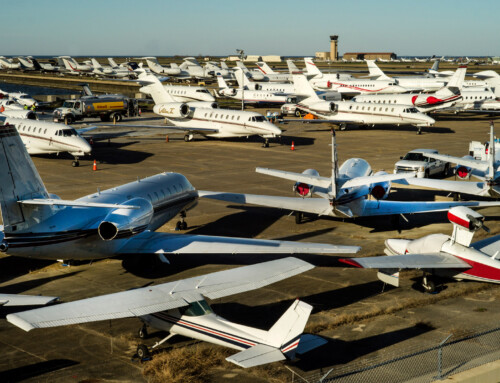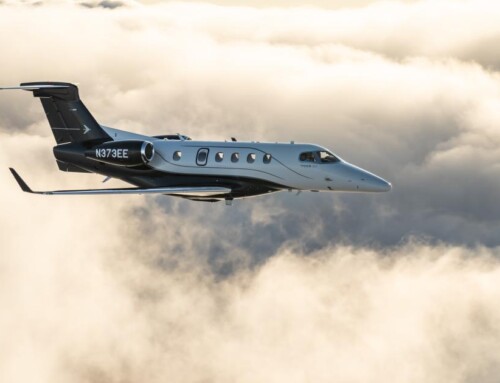With the knockout phase of FIFA World Cup having started on Saturday, Middle East-based flight support companies are warning tournament-goers about an extra layer of unpredictability through the final match on December 18.
“We knew which national teams were playing in the group stages, but we didn’t know who will make it to the knockout phase,” said Henry LeDuc, head of strategy development at UAS International Trip Support. “This means there were a lot of pre-planned flights already for the group stage. Ad hoc flights will rapidly build from countries whose teams advance to the next round.”
Some 48 matches took place in the group phase, which ran from November 20 to December 2, with qualifiers playing only 16 more. Tom Murphy, head of FBOs and aircraft management specialist at Gama Aviation Sharjah, told AIN that demand ramp-up starting with the knockout will only soar higher with the quarter-final, semi-final, and final games.
“Charters are going to be very challenging for ad hoc at the last minute,” he said. “Given the restrictions for gaining access to Qatar, you need a minimum of 72 hours’ notice for a flight. You also need a hire car, as proof that you’ve got a match ticket. Last-minute charter is going to be very difficult.”
To meet expected spikes in demand, several aircraft charter companies in the region—including Qatar Executive, Empire Aviation Group, Jet Aviation, and ExecuJet—are making extra aircraft available to tournament-goers on charters and shuttles.
UAE-based Royal Jet and Jetex signed a partnership early last month to operate on-demand 30-seat private jet flights between Dubai and Doha for the duration of the competition. Royal Jet operates the world’s largest fleet of Boeing Business Jets and announced the acquisition of its 13th aircraft at the Abu Dhabi Air Expo at the beginning of November. It said 11 of its BBJ aircraft would be available for the shuttle flights.
“The partnership with Jetex enables Royal Jet to fulfill tourism demand during this exciting period in the Gulf Cooperation Council’s history,” said RoyalJet CEO Mohammed Husain Ahmed. The Abu Dhabi-Doha return itinerary costs $7,900 per seat.
Hadid International Trip Support’s September 2022 “Airport Operational Overview” said that only two airports—Hamad International Airport (OTHH) and Doha International Airport (OTBD)—would be available to serve fans wishing to attend matches. “Matchday shuttle flights will be operating from Dubai, Jeddah, Kuwait City, Muscat, and Riyadh,” it said.
According to official FIFA World Cup 2022 rules, flights operating to Doha are to be distributed according to priority: all scheduled services and additional scheduled services will be accommodated at OTHH; charter services at either OTHH or OTBD subject to slot availability; general and business aviation (GA/BA) services primarily at OTBD; and state and VVIP services will take place at either OTHH or OTBD, on the basis of local authorities’ requirements.
Hadid said business jet users need to apply for a slot booking deposit number to obtain a ground-handling confirmation number before obtaining slot clearance. “Apply for landing clearance 72 hours before the intended flight takes place,” it said.
Slot cancellations received on the day of operation and no-shows will be subject to a $20,000 penalty per flight for GA/BA flights and loss of slot booking deposit. Hadid recommends Dubai Al Maktoum International Airport or Abu Dhabi Al Bateen Executive Airport for parking during the tournament.
UAS warned operators to bear in mind that to get into Qatar, they needed to overfly Iraq, Iran, or Saudi Arabia. “It can be a dynamic and fluid situation in some of the airspace around Qatar,” said Matt Borie, head of intelligence at Osprey Flight Solutions.
“It’s one of the safest countries in the Middle East and there will be widespread deployment of security forces,” Borie noted. “There are regulations in the country you will want your crew and passengers to be aware of, especially around alcohol, dress and attire, plus specific things you’re going to have to have in place for clients to enter the country. And if those aren’t met, there could be security issues. The unpredictable nature of the region is something you don’t have control over.”
UAS said that despite the multi-billion dollar investment the long-awaited tournament has commanded, there will be a major strain on resources. Some 1.5 million people were expected to come into the region, with 1,300 flights daily planned at Qatar’s two airports alone—either scheduled, shuttle, or charter.
“Look at further airfields and park at other locations, like Abu Dhabi, Sharjah, or Dubai, in the UAE, or Muscat, in Oman, a little further to the east, with similar accommodation and facilities,” Borie said. “Further to the west, there’s Jordan’s Aqaba Airport, too, with less demand on ground transport, hotels, medical services, and restaurants.”
“More than ever, the focus for operators is going to be running on time,” said Gama’s Murphy. “Sharjah, given it’s not as congested as our competitors in Dubai—taxi times are around six minutes, and it’s zero slot-restricted—is a good option to assist operators in running on time and avoiding fines.”
Gama is running a campaign for anybody operating into Qatar, giving every aircraft seven days of free parking at Sharjah, though this requires pre-approval. “Operators will need to provide registration and schedule,” Murphy said.
“Obviously, we’re going to have limited capacity because the general consensus is that there are going to be a lot of aircraft on the ground in the UAE, so we are not going to be able to give this deal to everybody. It’s on a first-come, first-served basis; the efficient airport, lack of congestion, the incentive for free parking and line maintenance hangarage, and airside transportation add up to a good solution.”
Source: AINOnline

 Hawker-Beechcraft Hawker 400XP
Hawker-Beechcraft Hawker 400XP Cessna Citation V
Cessna Citation V Beechcraft Premier IA
Beechcraft Premier IA Beechcraft King Air 350
Beechcraft King Air 350








